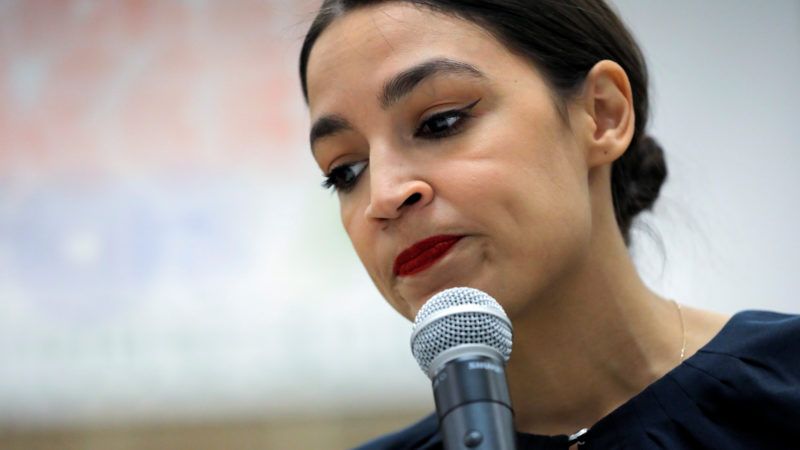The 2020 Election Results Look Like a Massive Rebuke of Socialism
A Biden presidency and a GOP Senate could keep the left out of power for years.

Summarizing the key lessons that Democrats should take away from election results that were much less favorable than expected, Rep. Abigail Spanberger (D–Va.) reportedly told fellow members of her caucus during a conference call on Thursday that they shouldn't say the word socialism "ever again."
This would be good policy advice, whether or not it's good political advice. But as it turns out, socialism is looking like a major political loser this election cycle, with the specter of it likely costing former Vice President Joe Biden his chance at winning Florida. Indeed, this could be a rough couple of years for progressives: A Biden presidency coupled with a Republican-controlled Senate—an outcome that is far from certain, but gaining some degree of likelihood—would make it almost impossible for Democrats to push through the structural changes (such as D.C. statehood or an expansion of the Supreme Court) that could allow the left to take power.
This is something of a reversal of fortunes. For democratic socialists, the 2020 election cycle began with great promise; the hard left had not one but two ardently progressive primary candidates in Sens. Elizabeth Warren (D–Mass.) and Bernie Sanders (I–Vt.), the latter of whom had shown auspicious resilience against Hillary Clinton in 2016. There had also been small, encouraging signs in the years between then and now: the surprise election of Rep. Alexandria Ocasio-Cortez (D–N.Y.) in 2018, the success of socialist magazines and podcasts, the increasing salience of issues like economic inequality and Medicare for All, the formation of "the Squad."
But neither Warren nor Sanders could overcome Biden, the candidate who had worked hardest to put serious distance between himself and the term socialist. If anything, Biden needed to work even harder at this, since President Donald Trump's reelection campaign was able to tie Democrats to Latin American socialism in the minds of some Florida voters, leading to a surprisingly good showing for Trump among Latino—and particularly Cuban—voters.
Progressives often operate under the assumption that their failure to win elections is a result of malfeasance: More democracy, more activism, and more turnout will produce the broad mandate they need to enact change. They also assume that an increasingly racially diverse electorate will override the white voters who don't support fundamental, revolutionary changes to the economy. But the 2020 results are casting doubt on both of these beliefs: Trump is on track to have the GOP's best showing among minorities in decades, and while he will indeed lose the popular vote to Biden, the unusually high turnout did not lend itself to any sort of blue wave.
Not all of the results are in yet, and it's possible that subsequent election-related developments could change the outlook for progressives. But a GOP-controlled Senate will kill any chances of big, lofty, leftist legislation. The Senate could vote down Biden's judicial picks, and they could thwart liberal Cabinet nominees. Warren's bid for Treasury Secretary will be dead in the water.
"The Biden presidency will be doomed to failure before it starts," writes New York magazine's Eric Levitz, who correctly notes that progressives are on the brink of catastrophe.
Democrats are clearly unhappy with this result, and many blame the excesses of the left for putting them in such a position.
"Democrats' messaging is terrible; it doesn't resonate," Rep. Kurt Schrader (D–Ore.), a moderate Blue Dog Democrat, told The Washington Post. "When [voters] see the far left that gets all the news media attention, they get scared. They're very afraid that this will become a supernanny state, and their ability to do things on their own is going to be taken away."
Former Missouri Democratic Senator Claire McCaskill, now a commentator for MSNBC, told viewers on Wednesday she was worried that far-left positions on issues were scaring potential voters away. Her remarks drew a rebuke from Ocasio-Cortez, who said McCaskill's loss in 2016 means she's no expert on winning elections. (McCaskill might have responded that AOC's own victory in an inner-city House district hardly confers a great deal of political expertise.)
Even some progressives think it's in the party's best interest to at the very least stop using the word socialism.
"I think Republicans did get some traction trying to scare people on this 'socialist narrative,'" Rep. Jared Huffman (D–Calif.), a member of the Congressional Progressive Caucus, told The Washington Post. "What's the point of embracing a phrase like that?"
If a large number of Democrats actually absorbed this message, it would be icing on the cake. Right now, it appears that some of the worst impulses of both parties have been checked, and the next administration will take office with neither a mandate nor an ability to enact transformational economic policy changes.


Show Comments (389)